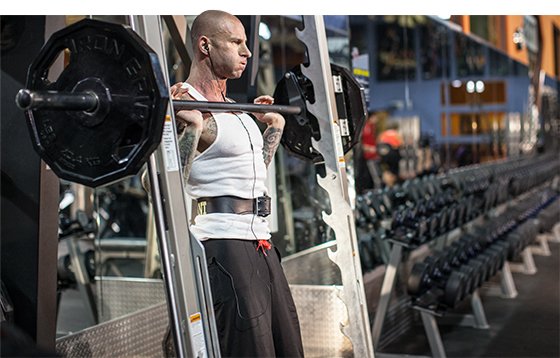
Ask The Supplement Guru: What Can Take The Place Of Whey?
Whey protein powder may be the reigning king for building muscle mass, but don't underestimate the dairy protein it comes from. Milk protein concentrate and isolate offer some unique advantages for bodybuilding, especially in a pinch!
I didn't plan ahead, man. Now I'm heading down the highway with no healthy food in sight. No protein powder, meat, chicken breast, eggs, nothing, trying to figure out how I'm going to meet my macros for the day. Have any suggestions for a quick food or protein supplement I can find easily?
When I'm out on the road, it's hard to find high-quality supplements or lean meats (that aren't slathered in trans fats) to hit my daily protein intake. If I need a convenient, low-carb, protein-rich food, I often pull into a gas station or convenience store and grab an RTD (ready-to-drink) like Muscle Milk.
But, the last time I posted a photo to Facebook of the Muscle Milk that I grabbed while on the go in Florida, I was surprised at how many negative comments it generated. People think of it as overpriced chocolate milk marketed to bodybuilders, not a legitimate part of a lifter's diet.
The reason the Milk gets a bad rap is that if you look at the ingredients, you'll notice that whey protein is way down on the list. The ingredient that makes up most of the protein content is milk protein, in the form of milk protein isolate and milk protein concentrate.
So, is milk protein an inferior dairy protein source? No! It's actually a high-quality dietary protein source, and when you don't have access to other food with the nutrients you need, it can help get your amino acid intake up where you need it. Here's why you shouldn't overlook it.
What's milk protein made of?
Milk protein is made of whey protein and casein protein. More specifically, it is about 20 percent whey and 80 percent casein. It is manufactured by removing a good portion of the carbohydrates and fat from cow's milk through gentle filtration processes. This milk protein concentrate can then be further processed into milk protein isolate. Of the two, whey protein isolate has the least fat, but they're both lean protein sources, with most of the calories coming from the protein content, not from milk fat.
Milk protein concentrate (MPC) is pretty close to its natural state, as it would be found in milk. In addition to its powerful amino acids, MPC contains beneficial milk peptides and microfractions, such as beta-lactoglobulin, alpha-lactalbumin, bovine serum albumin peptides, immunoglobulins, lactoferrin, and lactoperoxidase, all of which provide health benefits and antioxidant properties. Having a high enough intake of these nutrients is also important in a protein-rich bodybuilding diet—it isn't just about protein grams!
The casein in MPC is also maintained in its original state, known as micellar casein. This form of casein digests the slowest, providing a prolonged delivery of amino acids to muscle fibers.
Is milk protein as good as whey protein?
From my perspective, the only reason people think milk protein is a lower-quality bodybuilding protein is they believe whey protein is the only high-quality protein you should include in your diet, and all other protein powders are seriously inadequate compared to it. This is far from the truth.
Now, there is no debating the fact that whey protein is high-octane nutrition. You definitely want to make sure that you get whey any time you consume a protein powder, and especially around workouts when you need high-protein foods. Whey is the preferred choice due to its high content of BCAAs and its rapid digestion rate. Plus, it also contains the peptides and microfractions found in milk that I discussed earlier.

However, it's also important to remember that MPC is whey protein. Well, 20 percent of it is, anyway. Of course, the rest of it is micellar casein. But that doesn't decrease the quality of MPC—it actually increases it.
As I've written many times, research shows that adding casein protein to whey enhances the anabolic effect of the protein—the literal body building that is why we all work so hard.1,2 Fast-digesting whey protein is important for quickly spiking muscle protein synthesis, but when casein protein is included, it maintains that higher protein synthesis for considerably longer than the whey by itself.
Casein also puts the breaks on muscle protein breakdown. And since growth occurs when muscle protein synthesis is greater than muscle protein breakdown, this all adds up to greater muscle growth.
Plus, having a more sustained source of amino acids keeps you from getting hungry, making weight-loss easier to manage, but still giving you enough protein to maintain muscle mass.
Wrapping Up
Don't take this the wrong way, but if I were given a choice of just plain whey protein or milk protein isolate, I would choose the milk protein. This is because you get a high-quality blend of both whey and casein in their most natural states, closer to actual milk. Gram for gram it's just as nutritious as any other dairy-based protein, and includes all the health-boosting milk compounds.
[photo] [caption]"Don't take this the wrong way, but if I was given a choice of just whey or milk protein isolate, I would choose the milk protein."Ideally, I would prefer a little bit more whey and possibly a protein source that digests somewhere in between, such as soy or egg protein, to bridge the gap between the fast-digesting whey and the slow-digesting micellar casein. But really, MPC does the job well.
So, the next time you see milk protein concentrate, milk protein isolate, or milk protein caseinate listed on a protein powder, RTD, or bar, don't snub it. Milk protein is one of the highest-quality forms of dairy protein you can consume, a rich source of amino acids and complete proteins, a great source of calcium and vitamin D, and definitely better for your diet than most other dairy products at the gas station. Muscle Milk isn't just fancy chocolate milk! Now you know why.
Learn More From Jim Stoppani
- Why you need branched-chain amino acids, another key nutrition supplement for bodybuilders.
- The backstory: How Jim Stoppani became a professional bodybuilder and Ph.D.
- How to try intermittent fasting, a convenient diet approach that can help you manage your weight.
- Soop, M., Nehra, V., Henderson, G. C., Boirie, Y., Ford, G. C., & Nair, K. S. (2012). Coingestion of whey protein and casein in a mixed meal: demonstration of a more sustained anabolic effect of casein. American Journal of Physiology-Endocrinology and Metabolism, 303(1), E152-E162.
- Tipton, K. D., Elliott, T. A., Cree, M. G., Wolf, S. E., Sanford, A. P., & Wolfe, R. R. (2004). Ingestion of casein and whey proteins result in muscle anabolism after resistance exercise. Medicine & Science in Sports & Exercise, 36(12), 2073-2081.
